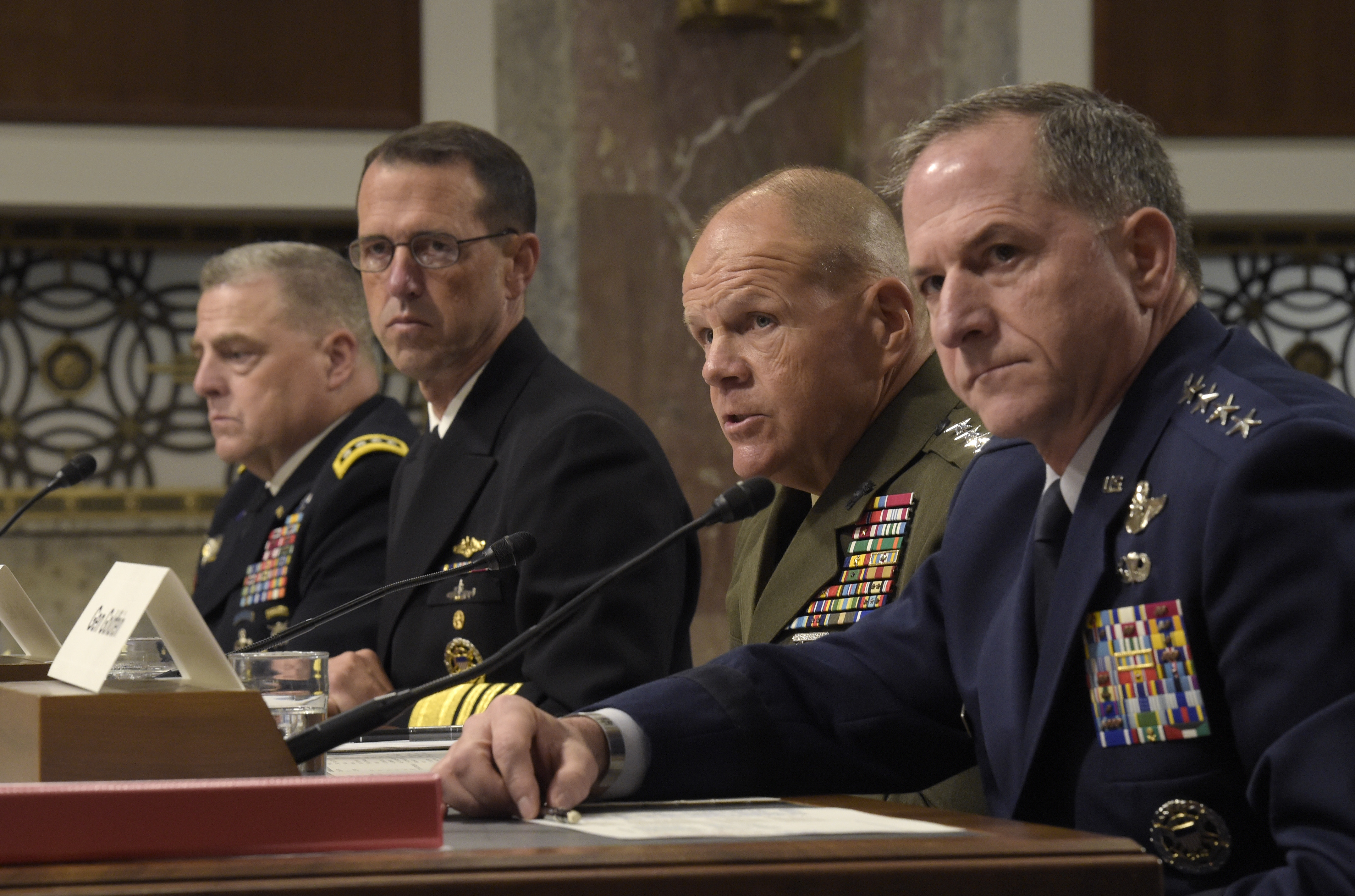America's top uniformed military chiefs are tweeting strong anti-racism statements, for some reason


A free daily email with the biggest news stories of the day – and the best features from TheWeek.com
You are now subscribed
Your newsletter sign-up was successful
After President Trump's initial response to the white nationalist "Unite the Right" march in Charlottesville, where he condemned the violence "from many sides," the top uniformed U.S. Navy officer, Adm. John Richardson, decided it was a good time to issue a statement affirming that the U.S. Navy "forever stands against intolerance & hatred."
After Trump dug in on Tuesday, insisting that "both sides" were to blame for the Charlottesville melee, and said there are some "very fine people" among the torch-wielding alt-right marchers as well as the people protesting against them, the commandant of the U.S. Marine Corps, Gen. Robert Neller, tweeted that there is "no place for racial hatred or extremism" in the Marines.
He was soon joined in what might be viewed as subtweeting the president, or perhaps just a restatement of military values, by Gen. Mark Milley, the U.S. Army chief of staff, and then by Air Force Chief of Staff Gen. Dave Goldfein.
The Week
Escape your echo chamber. Get the facts behind the news, plus analysis from multiple perspectives.

Sign up for The Week's Free Newsletters
From our morning news briefing to a weekly Good News Newsletter, get the best of The Week delivered directly to your inbox.
From our morning news briefing to a weekly Good News Newsletter, get the best of The Week delivered directly to your inbox.
Several prominent Republicans — including the last two GOP presidents — have stepped up to denounce racism and white supremacy after Trump's comments, and the business leaders on two of Trump's advisory committees jumped ship, "but it was the statements from the country's top uniformed military leaders that broke most dramatically from the president," the Los Angeles Times argues.
None of the uniformed military leaders mentioned Trump by name, but Trump's Veterans Affairs secretary, David Shulkin, did on Wednesday, when he said that Trump speaks for himself but as far as Shulkin is concerned, "it is a dishonor to our country's veterans to allow the Nazis and the white supremacists to go unchallenged." Peter Weber
A free daily email with the biggest news stories of the day – and the best features from TheWeek.com
Peter has worked as a news and culture writer and editor at The Week since the site's launch in 2008. He covers politics, world affairs, religion and cultural currents. His journalism career began as a copy editor at a financial newswire and has included editorial positions at The New York Times Magazine, Facts on File, and Oregon State University.
-
 Why is the Trump administration talking about ‘Western civilization’?
Why is the Trump administration talking about ‘Western civilization’?Talking Points Rubio says Europe, US bonded by religion and ancestry
-
 Quentin Deranque: a student’s death energizes the French far right
Quentin Deranque: a student’s death energizes the French far rightIN THE SPOTLIGHT Reactions to the violent killing of an ultraconservative activist offer a glimpse at the culture wars roiling France ahead of next year’s elections
-
 Secured vs. unsecured loans: how do they differ and which is better?
Secured vs. unsecured loans: how do they differ and which is better?the explainer They are distinguished by the level of risk and the inclusion of collateral
-
 British warship repels 'largest Houthi attack to date' in the Red Sea
British warship repels 'largest Houthi attack to date' in the Red SeaSpeed read Western allies warn of military response to Iranian-backed Yemeni rebels if attacks on ships continue
-
 Houthi rebels claim Red Sea ship attacks
Houthi rebels claim Red Sea ship attacksspeed read Iran-backed Yemeni group vows to escalate aggression towards Israel-linked vessels in revenge for Gaza war
-
 Israel plans next phase of Gaza war as first hostages released
Israel plans next phase of Gaza war as first hostages releasedSpeed read After four-day ceasefire 'we will not stop' until destruction of Hamas, says Israel
-
 Mob storms Russian airport 'looking for Jews'
Mob storms Russian airport 'looking for Jews'Speed Read Plane from Israel surrounded by rioters chanting antisemitic slogans after landing in Russia's Dagestan region
-
 Tuberville's military promotions block is upending lives, combat readiness, 3 military branch chiefs say
Tuberville's military promotions block is upending lives, combat readiness, 3 military branch chiefs saySpeed Read
-
 Ukraine's counteroffensive is making incremental gains. Does it matter in the broader war?
Ukraine's counteroffensive is making incremental gains. Does it matter in the broader war?Speed Read
-
 US commissions first-ever Navy ship in a foreign port
US commissions first-ever Navy ship in a foreign portSpeed Read
-
 British spy chief, Wagner video suggest Prigozhin is alive and freely 'floating around'
British spy chief, Wagner video suggest Prigozhin is alive and freely 'floating around'Speed Read
